- Research
- Research Centers
- Journals
- Admission
- Introduction
- Programs
- Application
- Alumni & Giving
- Alumni Club
- Giving
The 3rd Presidents’ Forum of the Global Alliance of Foreign Studies Universities was held on Sept 26 to celebrate the 80th anniversary of Beijing Foreign Studies University (BFSU). With the theme of “new visions on global development of foreign studies universities”, the forum was held both online and offline.
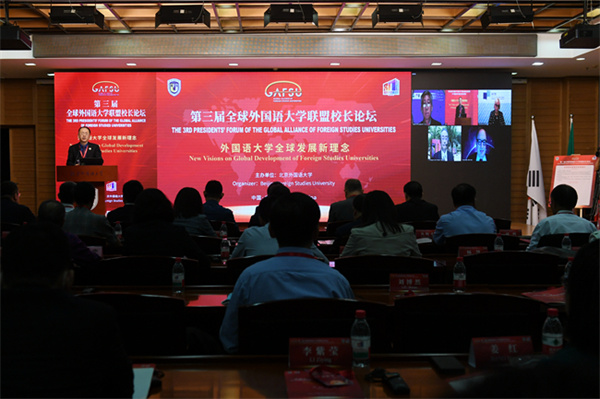
BFSU holds the 3rd Presidents’ Forum of the Global Alliance of Foreign Studies Universities on Sept 26.
Representatives from the Publicity Department of the CPC Central Committee, enterprises in the field of language and translation and member universities of the alliance attended the forum.
The forum was presided over by Jia Wenjian, deputy secretary of the CPC BFSU committee and vice-president of the university.
At the beginning of the forum, Yang Dan, deputy secretary of the CPC BFSU committee and president of the university, signed the Global Language Education Community Initiative (Beijing 2021) with representatives from other renowned foreign studies universities from China and abroad.
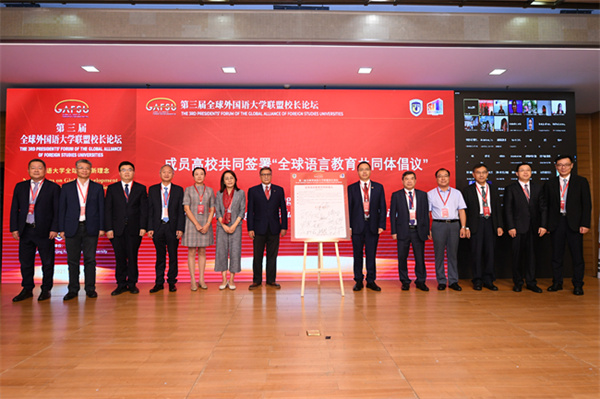
Representatives sign the Global Language Education Community Initiative (Beijing 2021) on Sept 26.
The initiative aims to cope with the unprecedented challenges faced by human language exchanges caused by accelerated globalization, digitalization and smart transformation. It calls on member universities of the alliance to rise to the challenges, pool their wisdom and resources, and build a better future of global language education with a pioneering and innovative spirit.
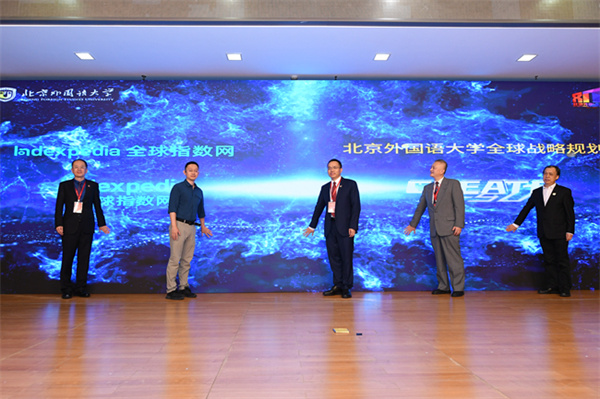
The release of indexpedia and BFSU Global Strategic Planning (2020-2050) on Sept 26
Following the signing ceremony, representatives released indexpedia, an indexed website, and issued the BFSU Global Strategic Planning (2020-2050).
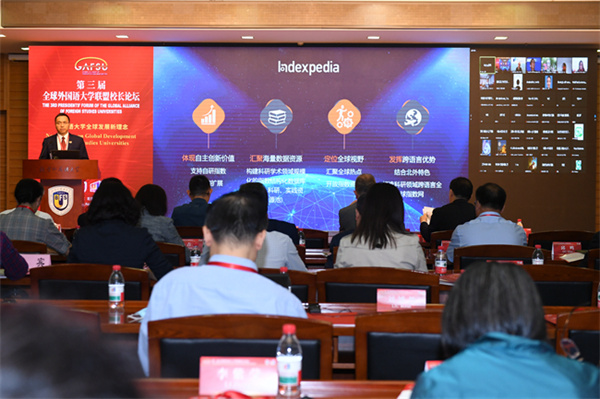
Yang Dan, deputy secretary of the CPC BFSU committee and president of the university, speaks at the 3rd Presidents’ Forum of the Global Alliance of Foreign Studies Universities on Sept 26.
Yang illustrated the concept of indexpedia. As the first index encyclopedia in the world, the website is committed to breaking disciplinary barriers by building a structured, dynamic and interactive platform and forming a global indexed general knowledge system.
At present, indexpedia has gathered 1,200 important indexes in 18 fields such as economics, society and culture, and covers 196 countries and regions. The website will launch other major language versions to attract researchers around the world and expand its global influence.
Jia explained the core of the BFSU Global Strategic Planning (2020-2050), and boiled it down into “BFSU CREATE”.
“BFSU in the name stands for Beijing, Faculty, Students and Uni-competitiveness, while CREATE stands for global connection, global reputation, global educators, global academic research, global talents and global eco-campus,” Jia said.
“The planning describes BFSU’s visions of supporting the national strategy, boosting scholars’ global competitiveness, cultivating students’ global competence, enhancing BFSU’s global influence, facilitating cultural exchanges and mutual learning between China and foreign countries and serving the construction of a community with a shared future for mankind,” he said.
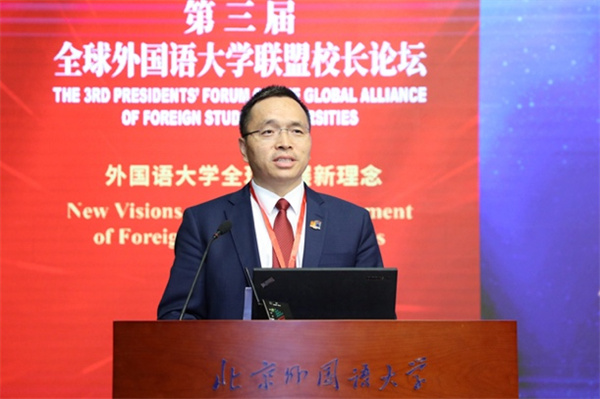
Yang Dan, deputy secretary of the CPC BFSU committee and president of the university, delivers a keynote speech at the 3rd Presidents’ Forum of the Global Alliance of Foreign Studies Universities on Sept 26.
Yang gave a keynote speech on the topic of “creating a new future of language education with the notion of a global community”. He pointed out that global language education is facing new challenges, including the intensified endangerment and frequent conflicts of global languages and the lack of mapping of the knowledge domain for global governance.
He called for the establishment of a global language education community through supporting language teaching, language research, language service and language protection; a global cultural protection community that respects language diversity and inclusively enhances the recognition of the cultures of all countries; and a global governance research community that can produce a global knowledge graph.
“We advocate achieving win-win cooperation in global language education, protecting diverse civilizations and creating a new future of global governance and area studies by adopting the notion of a global community of languages, cultural protection and international governance,” Yang said.
Kim In-chul, president of Hankuk University of Foreign Studies (HUFS), talked about HUFS’s innovative talent training mode and teaching methods, as well as its experience in coping with the impact of the COVID-19-pandemic on international student flow.
Liu Li, president of Beijing Language and Culture University, shared her views on the trend of international Chinese education and the direction of Chinese teacher education.
Anastas Gerdzhikov, rector of Sofia University St. Kliment Ohridski, talked about the importance of mutual benefit and mutual learning among universities within the alliance.
Dong Hongchuan, president of Sichuan International Studies University, expressed his opinions on methods of expanding the opening of higher education in the new era.
Irina A. Krayeva, president of Moscow State Linguistic University, analyzed the developing philosophy of foreign studies universities from a new perspective.
Cong Mingcai, vice-president of Dalian University of Foreign Languages, introduced the role the University of Shanghai Cooperation Organization has played in cultural exchanges between China and foreign countries to serve the Belt and Road Initiative.
Enrique Graue, president of Universidad Nacional Autónoma de México (UNAM), described UNAM’s academic exchanges with its global partners.
Sun Jisheng, vice-president of China Foreign Affairs University (CFAU), shared CFAU’s achievements and successful experience in cultivating global governance talents.
These exchanges of views were of great significance for the global development layout design, talent training mode innovation, educational cooperation and exchange, and international communication capacity construction of foreign studies universities.
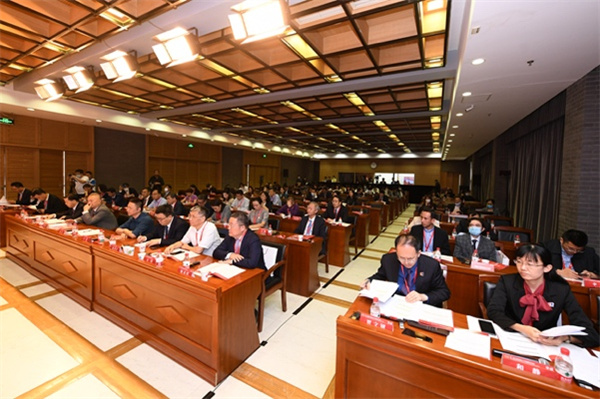
Representatives from renowned foreign studies universities from China and abroad exchange views on Sept 26.
During the free discussion session, representatives from Universidad de Lima, the Moscow State Institute of International Relations, Tokyo University of Foreign Studies, Chiang Mai Rajabhat University, Minsk State Linguistic University and other member institutions made speeches online or via video links.
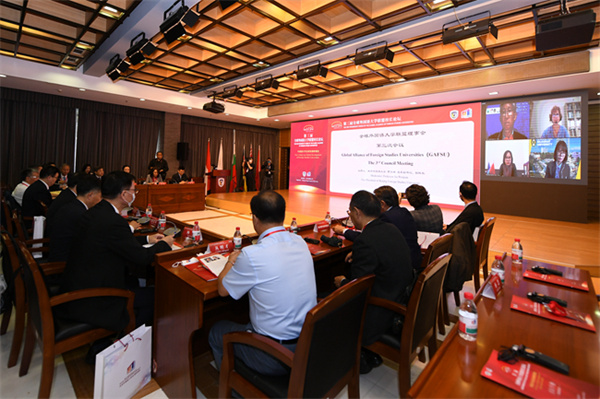
The council of the global alliance of foreign studies universities holds its third board meeting on Sept 26.
The council of the global alliance of foreign studies universities held its third board meeting before the start of the forum. The council reviewed the alliance’s work in the last two years, deliberated and approved the Capital University of Economics and Business and Zhejiang Normal University as new members, discussed development orientation from 2021 to 2022, consulted and deliberated about cooperation priorities and the working mechanism of the council, and approved Shanghai International Studies University (SISU) as the organizer of the fourth forum in 2023.
Li Yansong, president of SISU, made a statement at the forum.
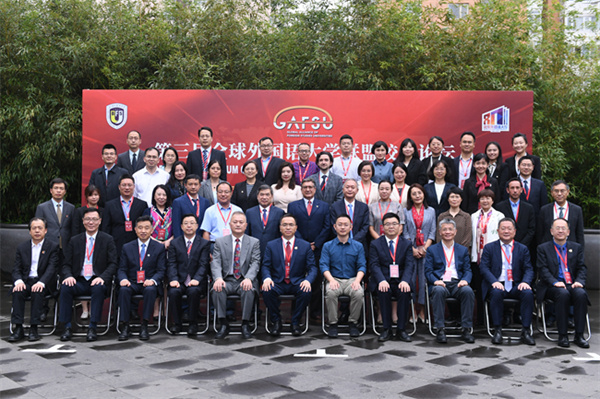
More than 100 experts and scholars attend the 3rd Presidents’ Forum of the Global Alliance of Foreign Studies Universities on Sept 26.
The forum attracted more than 100 teachers and experts from the member universities of the alliance. Representatives from 23 Confucius Institutes and Confucius Classrooms hosted by BFSU in 18 countries around the world participated in online discussions.